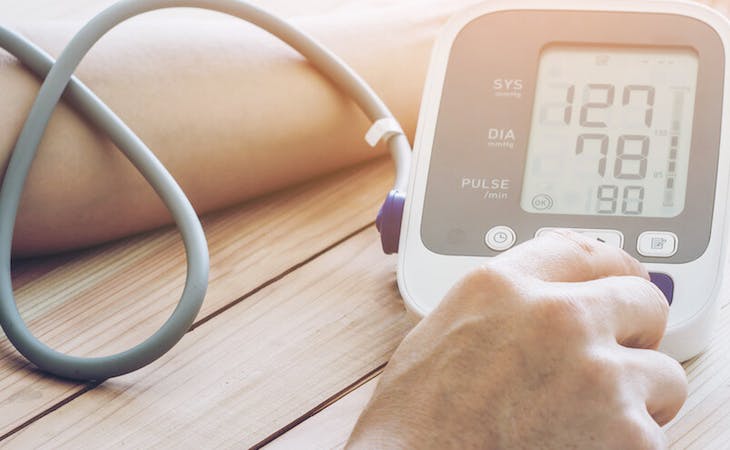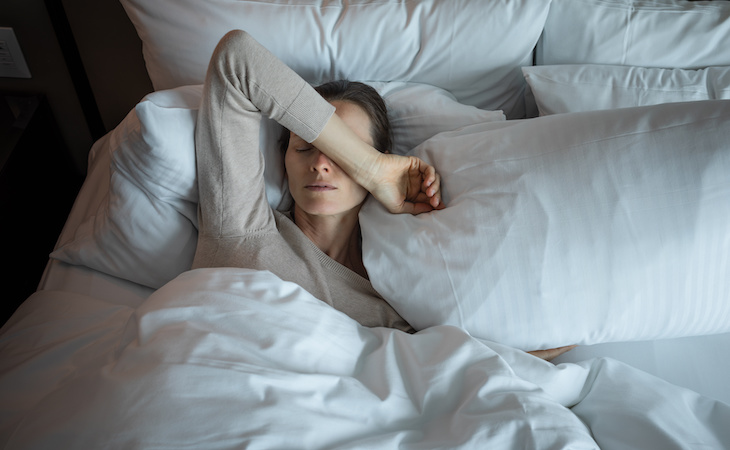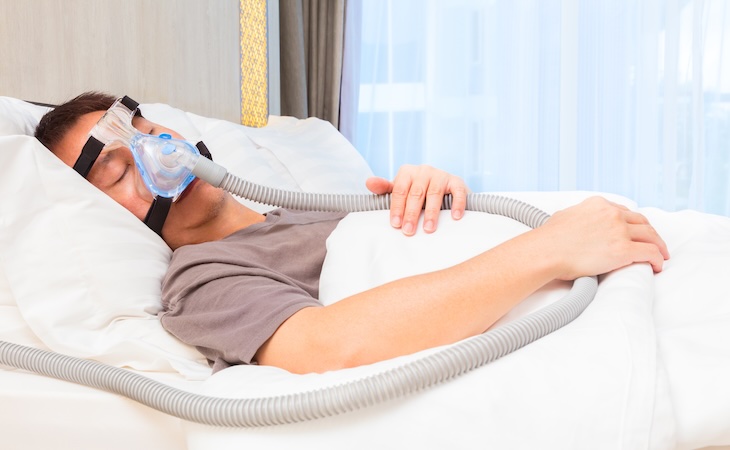According to the Centers for Disease Control and Prevention, 108 million Americans have high blood pressure—that’s almost half of the adults in the country. Additionally, more than one in three aren’t getting regular adequate sleep. And while many things play a role in hypertension and in sleep, there’s a connection between the two.
Read on to learn about the relationship between sleep and blood pressure and the steps you can take to manage high blood pressure and sleep better.
What is hypertension?
Simply put, blood pressure is the amount of pressure the blood exerts upon the walls of the arteries—and hypertension is the medical term for high blood pressure.
To measure your blood pressure, a healthcare provider uses an arm cuff. The reading is usually something like “117 over 75.” The top number is the systolic blood pressure—that’s the pressure in your arteries when your heart beats. The bottom number is the diastolic blood pressure—the pressure in your arteries between heart beats. Both are measured in “mm Hg,” or millimeters of mercury.
The American Heart Association (AHA) divides blood pressure ranges into five categories:
Category Systolic Blood Pressure (mm Hg) Diastolic Blood Pressure (mm Hg) Normal Less than 120 Less than 80 Elevated 120-129 Less than 80 Stage 1 hypertension 130-139 80-89 Stage 2 hypertension 140 or higher 90 or higher Hypertensive crisis (consult a doctor immediately) 180 or higher 120 or higher
Certain traits and lifestyle habits can increase or decrease your risk of high blood pressure. The things you can’t really control include:
- Genetics: A family history of hypertension may put you at greater risk.
- Age: The older you are, the higher your risk.
- Gender: Before the age of 65, men are more likely than women to get hypertension. At 65 and older, women are more likely than men to get high blood pressure.
- Race: In the U.S., Black people have a higher prevalence of hypertension than other races and ethnicities.
The risk factors you can control include:
- Physical activity: Being active helps keep your heart healthy.
- Diet: Eating a diet low in sodium and high in potassium may help decrease blood pressure.
- Alcohol consumption: Drinking more than—at most—one drink a day for women or two a day for men can increase blood pressure.
- Smoking: Chemicals in cigarette smoke damage the heart and blood vessels.
- Stress: Not only can too much stress increase blood pressure, but stress may cause you to turn to other things—such as unhealthy foods and alcohol—that increase the risk of hypertension.
- High weight: Having a higher BMI can make your heart work harder to pump blood throughout your body.
Perhaps the scariest thing about high blood pressure is that it’s a “silent” condition. Most people don’t have any symptoms, which is why it’s so important to regularly have your blood pressure checked. If you don’t monitor and manage hypertension, it can lead to:
- Heart attack
- Stroke
- Heart failure
- Angina (chest pain)
- Kidney failure
- Vision loss
Sleep and blood pressure
Additionally, there appears to be a bidirectional relationship between high blood pressure and sleep.
For one, research from the University of Arizona shows a poor night’s sleep can cause blood pressure to spike that night and also the next day.
“The thinking is that disordered sleep affects the autonomic nervous system,” explains Susan Besser, MD, primary care provider specializing in family medicine with Mercy Personal Physicians at Overlea in Baltimore. “This is the system that controls our ‘flight or fight’ response.” Too little sleep or poor quality sleep “can leave the person in a perpetual state of alertness so the body can’t relax and their blood pressure stays up,” she says.
This may also explain why people with chronic insomnia are at a much higher risk of hypertension. In a study published in Hypertension in 2015, people with insomnia who took longer than 14 minutes to fall asleep during daytime nap tests had three times the risk of high blood pressure compared with normal sleepers.
“Normally with sleep, the blood pressure lowers, but with a sleep disorder this dip may not happen,” Besser says.
Lastly, approximately half of the people who have hypertension also have sleep apnea, and each condition may exacerbate the other. It’s believed that changes in the sympathetic and parasympathetic nervous systems and systemic inflammation may partly explain this relationship.
Combating high blood pressure
No matter your genetic risk for hypertension, you can adopt healthy behaviors that may reduce your risk—and help you sleep better.
Exercise regularly
Being physically active can help reduce blood pressure. The AHA recommends aiming for 150 minutes of moderate-intensity physical activity (an effort at which you could talk but not sing) each week.
However, if you’re not currently active, gradually build up to 150 minutes, dividing that time over several days. Also choose activities you enjoy, such as walking, biking, or dancing, because you’re more likely to stick to a fitness routine if you like what you’re doing.
Pay attention to your diet
“Some people are very sensitive to salt, and that causes a rise in blood pressure, likely due to fluid retention,” Besser says. Aim for no more than 2,300 milligrams of sodium a day, paying particular attention to packaged foods and meals prepared outside the home.
Additionally, Besser recommends a diet lower in cholesterol, carbohydrates, and processed foods. Instead, focus on eating vegetables, fruit, whole grains, lean meat (poultry, fish, lean beef), nuts, beans and legumes, and olive oil. (These are the best foods to help you sleep.)
Limit alcohol consumption
Tossing back more than three alcoholic drinks in one sitting elevates blood pressure, and repeatedly binge drinking may cause a permanent increase. If you choose to drink, do so in moderation: That’s no more than one drink per day for women and two per day for men.
Quit smoking
Like alcohol, cigarette smoking also raises blood pressure when you’re puffing. Although the long-term relationship between smoking and hypertension isn’t completely clear, we know that the chemicals in tobacco smoke can damage blood vessels and increase the risk of atherosclerosis. And high blood pressure accelerates this condition where plaque builds up in the arteries. So all in all, smoking isn’t good for your heart.
Manage stress
When we’re stressed, our bodies go into “fight or flight” mode, which boosts our blood pressure temporarily. However, the chronic stress that so many of us face may contribute to chronic hypertension.
Managing stress as best you can is beneficial for both physical and mental health. Find what works for you, such as regular physical activity, meditation, journaling, yoga, or spending time in nature. Also consider working with a trained therapist or psychologist if you could use extra support.
Monitor your blood pressure
Since hypertension is a silent condition, the only way to know if you have elevated blood pressure is to monitor it. See a healthcare professional at least every three to five years if you’re 18 to 40 and have no other risk factors; if you have any risk factors or are older than 40, get your blood pressure checked at least once a year or get a home blood pressure monitor.
Stick to a consistent sleep schedule
Going to bed and rising at the same time—even on weekends—can help you fall asleep more easily and get better sleep. And sounder sleep, as well as the right amount of Z’s (seven hours each night may be ideal), may reduce your risk of hypertension.
Get tested for sleep apnea
It’s estimated that half the people who have high blood pressure also have sleep apnea—but you may not realize you have this condition. Talk to your healthcare provider, who can evaluate your symptoms and schedule a test if necessary.
Consult your doctor about medication
“This is a discussion you need to have with your primary care doctor to decide when is the right time to add medication to control your blood pressure,” Besser says.
Medications such as diuretics, ACE (angiotensin-converting enzyme) inhibitors, ARBs (angiotensin II receptor blockers), or calcium channel blockers may help you better manage your blood pressure.




